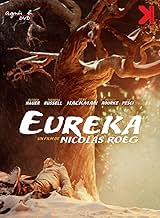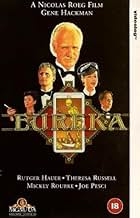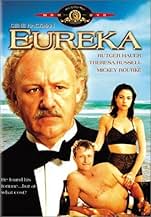IMDb रेटिंग
5.9/10
4.3 हज़ार
आपकी रेटिंग
अपनी भाषा में प्लॉट जोड़ेंIn 1925, a lone and obsessed Arctic prospector Jack McCann finally strikes gold. Twenty years later, he begins spiraling out of control when his only daughter becomes engaged to a man he str... सभी पढ़ेंIn 1925, a lone and obsessed Arctic prospector Jack McCann finally strikes gold. Twenty years later, he begins spiraling out of control when his only daughter becomes engaged to a man he strongly dislikes.In 1925, a lone and obsessed Arctic prospector Jack McCann finally strikes gold. Twenty years later, he begins spiraling out of control when his only daughter becomes engaged to a man he strongly dislikes.
- निर्देशक
- लेखक
- स्टार
- पुरस्कार
- कुल 1 नामांकन
फ़ीचर्ड समीक्षाएं
Rarely has a film had so much potential, that goes unrealized. Gene Hackman and his gold discovery is beautifully photographed, yet so unlikely and unrealistic, that it seems surreal. From the moment things shift to the island, the movie plays like a beautiful montage, with story continuity only an afterthought. It becomes merely a series of images strung together with philosophical messages, huge time jumps, flashbacks, and metaphysical nonsense. Yet, the images of ultra violence, nudity, snow, gold flakes, and the Victorian splendor, will linger long after the movie ends. From that standpoint at least some of "Eureka"s potential is realized, but not enough to grab the greatness that was within grasp. - MERK
I remember watching this movie a couple of times on cable over a decade ago. I don't know if it was supposed to be a mystery or noir but one of the things that struck me was the poor picture (perhaps it was intentional to keep up the mystery)
Generally, the actors did a very good job. I just feel the script was poor.
I too first saw this in London when it came out May 1983, at the Screen on the Hill. It was my O-level year, and I was a skinny, awkward 15-year-old, desperately trying to get into my first 18-rated film. It worked. But was it worth it? The film has an extraordinary opening section, as Gene Hackman finds the gold under the snow-encrusted earth, culminating in a spectacular, slow-motion explosion of rock and snow. Set to extracts of Wagner's DAS RHEINGOLD, it's unforgettable, thrilling cinema, and had my jaw dropping into my cappuccino. We also have the sight of a dying, half-frozen man blowing his brains out again and again, bringing to mind the disjointed, hallucinatory quality one recognises from the director of THE MAN WHO FELL TO EARTH and DON'T LOOK NOW. Stunning, disturbing stuff.
Unfortunately the momentum quickly slackens as we cut forwards in time to a rather dull, plodding melodrama about a Kane-like man who in his anguish says, "Once I had it all...now I only have everything." (Coming after the prologue, this also applies to the film itself.) There's some nasty scenes involving voodoo and Rutger Hauer doing something rather strange with a python, some gut-wrenching violence involving a blow-torch and the contents of a pillow, and a soap-opera court-room finale that feels as if it's wandered in from an entirely different film altogether. There are rumours of a different film lurking in this exuberant mess: one of the film's stars has hinted that it was not Roeg's final version that we saw. But I couldn't call this a success. Roeg fans should check it out as an oddity, but be warned: after the brilliant beginning, it's downhill all the way.
Unfortunately the momentum quickly slackens as we cut forwards in time to a rather dull, plodding melodrama about a Kane-like man who in his anguish says, "Once I had it all...now I only have everything." (Coming after the prologue, this also applies to the film itself.) There's some nasty scenes involving voodoo and Rutger Hauer doing something rather strange with a python, some gut-wrenching violence involving a blow-torch and the contents of a pillow, and a soap-opera court-room finale that feels as if it's wandered in from an entirely different film altogether. There are rumours of a different film lurking in this exuberant mess: one of the film's stars has hinted that it was not Roeg's final version that we saw. But I couldn't call this a success. Roeg fans should check it out as an oddity, but be warned: after the brilliant beginning, it's downhill all the way.
I had never heard of Ed Lauter until he died a few months ago, even though I had seen him in a number of movies; he simply hadn't registered in my mind. While watching Nicolas Roeg's "Eureka", I was surprised to see that Lauter co-starred. I had also never heard of Harry Oakes until I read about the movie. The movie had a good plot but seemed as though it could've been shorter. In the end, I think that the main point to derive from the movie is that prestige makes people go crazy. Gene Hackman's character struck gold and it made him rich, causing him to go nuts, and the insanity extends to his acquaintances. As shown in "It's a Mad, Mad, Mad, Mad World" and "The Wolf of Wall Street", people will do anything for money.
Anyway, it's an OK not great movie.
Anyway, it's an OK not great movie.
Of the Nicolas Roeg films I've seen thus far "Eureka" is in many ways the most conventional. Probably this is due to its being based on real-life events, to wit, the horrific murder in his palatial house of a powerful and super-wealthy man just as the Second World War is nearing its close.
Before we get to that, there's an eerie, atmospheric prologue set in the Yukon twenty years earlier where Gene Hackman's Jack McCann character achieved his one goal in life, to strike gold and become rich beyond his wildest dreams. Fast forward those twenty years and he's married to his now dissolute wife, Jane Lapotaire with an impulsive adult daughter, played by Theresa Russell, waited on hand and foot, living the life of luxury on his own private island in the Bahamas named Eureka after the word he uttered when making his lucky strike.
But of course, great wealth doesn't guarantee great happiness and so Jack's peace of mind is beset on two fronts. Firstly his impressionable daughter has fallen in with a handsome, libertine go-getter, Rutger Hauer's titled Frenchman Claude van Horn. Jack thinks Claude is literally a gold-digger and is provoked to extreme rage and violence against him when he learns the couple have secretly married. His other concern is that he's being pressurised by his up till now trusted business partner who's now in tow to a shady mobster who wants to open up Eureka to gambling, like a second Cuba.
How this self-made man confronts head-on both of these problems and the disastrous consequencies which follow, determines the outcome of the movie, culminating in his horrific killing and the subsequent trial of van Horn, the verdict coincidentally falling due on the day the war actually ends.
Like I said, this Roeg film is perhaps easier to follow than others in his catalogue, but naturally he throws in a few curve-balls along the way and elsewhere demonstrates his undoubted directorial bravura. The depictions of sex and violence are graphic, especially the drunken orgy scene masterminded by van Horn and the nightmarish slaying of McCann in his own bed but these are contrasted with the opulent depiction of the trappings of wealth and the matter-of-fact gravity of the extended courtroom trial.
I personally felt that rather like McCann himself, the film peaks at the moment he hits the motherlode, in a remarkably staged scene with McCann literally awash in his new wealth. There are strong performances by Hackman, and Hauer, in particular with Joe Pesci warming up on the sidelines for his future gangster roles under the direction of Scorcese.
Yes, the film is uneven with occasionally overripe dialogue and some confusing plot-shifts but it certainly works as a study of greed, power and the corruption of wealth.
Perhaps the moral here is that it's better just to let the rainbow fade rather than chase the pot of gold you imagine is at the end of it.
Before we get to that, there's an eerie, atmospheric prologue set in the Yukon twenty years earlier where Gene Hackman's Jack McCann character achieved his one goal in life, to strike gold and become rich beyond his wildest dreams. Fast forward those twenty years and he's married to his now dissolute wife, Jane Lapotaire with an impulsive adult daughter, played by Theresa Russell, waited on hand and foot, living the life of luxury on his own private island in the Bahamas named Eureka after the word he uttered when making his lucky strike.
But of course, great wealth doesn't guarantee great happiness and so Jack's peace of mind is beset on two fronts. Firstly his impressionable daughter has fallen in with a handsome, libertine go-getter, Rutger Hauer's titled Frenchman Claude van Horn. Jack thinks Claude is literally a gold-digger and is provoked to extreme rage and violence against him when he learns the couple have secretly married. His other concern is that he's being pressurised by his up till now trusted business partner who's now in tow to a shady mobster who wants to open up Eureka to gambling, like a second Cuba.
How this self-made man confronts head-on both of these problems and the disastrous consequencies which follow, determines the outcome of the movie, culminating in his horrific killing and the subsequent trial of van Horn, the verdict coincidentally falling due on the day the war actually ends.
Like I said, this Roeg film is perhaps easier to follow than others in his catalogue, but naturally he throws in a few curve-balls along the way and elsewhere demonstrates his undoubted directorial bravura. The depictions of sex and violence are graphic, especially the drunken orgy scene masterminded by van Horn and the nightmarish slaying of McCann in his own bed but these are contrasted with the opulent depiction of the trappings of wealth and the matter-of-fact gravity of the extended courtroom trial.
I personally felt that rather like McCann himself, the film peaks at the moment he hits the motherlode, in a remarkably staged scene with McCann literally awash in his new wealth. There are strong performances by Hackman, and Hauer, in particular with Joe Pesci warming up on the sidelines for his future gangster roles under the direction of Scorcese.
Yes, the film is uneven with occasionally overripe dialogue and some confusing plot-shifts but it certainly works as a study of greed, power and the corruption of wealth.
Perhaps the moral here is that it's better just to let the rainbow fade rather than chase the pot of gold you imagine is at the end of it.
क्या आपको पता है
- ट्रिवियाDirector Nicolas Roeg has said of this movie: "I was initially interested in a character who wanted to satisfy an all-consuming desire...'that's what I want'...but when he gets it what happens after his brief ecstatic moment? Nothing more than left over life to kill."
- गूफ़When Jack is run off his motorbike by Charles and Jack gets into Charles's car, a person in a yellow raincoat is reflected in the window of the car.
- भाव
Jack McCann: Once I had it all. Now I just have everything.
- इसके अलावा अन्य वर्जनAlthough the UK cinema version was intact the 1986 Warner video release was missing 7 seconds from the death of Jack McCann, notably shots of a flame thrower being run over his body and face. These were not cut by the BBFC so presumably they were distributor edits. DVD releases are fully uncut.
- कनेक्शनFeatured in Loose Talk: एपिसोड #1.7 (1983)
टॉप पसंद
रेटिंग देने के लिए साइन-इन करें और वैयक्तिकृत सुझावों के लिए वॉचलिस्ट करें
- How long is Eureka?Alexa द्वारा संचालित
विवरण
- रिलीज़ की तारीख़
- कंट्री ऑफ़ ओरिजिन
- आधिकारिक साइट
- भाषा
- इस रूप में भी जाना जाता है
- River of Darkness
- फ़िल्माने की जगहें
- उत्पादन कंपनियां
- IMDbPro पर और कंपनी क्रेडिट देखें
बॉक्स ऑफ़िस
- US और कनाडा में सकल
- $1,23,572
- दुनिया भर में सकल
- $1,23,572
इस पेज में योगदान दें
किसी बदलाव का सुझाव दें या अनुपलब्ध कॉन्टेंट जोड़ें



































